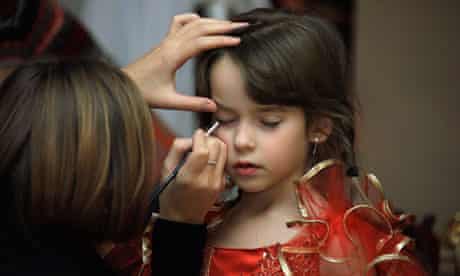A French government report is calling for a ban on "mini-miss" beauty pageants and children's lingerie to combat what it describes as the "hyper-sexualisation" of children.
The moves follow an international controversy over a Vogue magazine photographic shoot featuring provocative images of a 10-year-old French girl.
The parliamentary report, Against Hyper-Sexualisation: A New Fight For Equality, calls for a ban on child-size adult clothing, such as padded bras and high-heeled shoes for children, and an end to beauty competitions for the under-16s.
Chantal Jouanno, the author of the report and a senator and former sports minister, has also called for the outlawing of young models in advertising campaigns and the return of uniforms in primary schools as part of a series of measures to stem the psychological damage she believes is being done to children.
Jouanno said young girls were being disguised as "sexual candy" in a competition over appearance, beauty and seduction, which she said was "contrary to the dignity of the human being" and a step backwards in the battle for sex equality.
"This phenomenon is a real concern for society," Jouanno told Le Figaro newspaper. "Today, children are building their identities amid a regression of sexual equality and on the return of stereotypes contained in music clips, games, reality television programmes. The danger is not only individual but collective.
"We have a great responsibility as both politicians and parents."
She argued that while the sexualisation of children is not widespread in France, it is increasing and becoming acceptable because of what she described as the insidious "normalisation" of pornographic images.
The issue has also been taken up in Britain, Belgium and Quebec. A British report last year, Letting Children be Children, recommended excluding sexual imagery from children's daily lives by tighter controls on advertising and pre-watershed television schedules.
The French report was prompted by international outrage after publication of a multi-page feature in Vogue's December 2010 issue in which 10-year-old Thylane Loubry Blondeau, and two other girls, were photographed pouting and posing heavily made up, with lipstick, tight dresses, jewels and high heels.
While the feature initially failed to rouse anger in France, it caused outrage in America where the pictures were considered inappropriate, prompting the French government to announce its inquiry.
Vogue defended the article, saying the young models were simply dressing up "like maman", as all young girls do. Blondeau, whose mother is French actress turned designer Veronica Loubry and father former footballer Patrick Blondeau, has been modelling since she was five. Her mother, Loubry, defended the photographs in a blog at the time, writing: "The only thing that shocks me about the photo is that the necklace she is wearing is worth three million euros … my daughter isn't naked, let's not blow things out of proportion."
The view was not shared by most French mothers; a survey carried out at the time of the controversy by the parenting website Magicmaman found 84% of those asked thought the images of Blondeau were demeaning.
The government report, published on Monday, criticised the marketing of padded bras for eight year olds, thong underwear, make-up kits, and leggy dolls, all aimed at pre-pubescent girls under the age of 12.
Specialists involved in the research concluded that this precocious sexualisation affected mostly girls and caused "psychological damage that is irreversible in 80% of cases". At worse, said the report, it could result in eating disorders including anorexia.
As well as banning clothing and make up considered inappropriate for young girls, Jouanno also proposes making it illegal for top fashion houses or companies to use models under 16 in their campaigns.
Reintroducing school uniforms was a way of combatting competition between pupils over fashion label clothes which highlight social inequalities, said the report.
